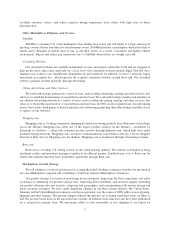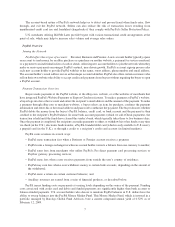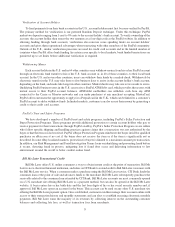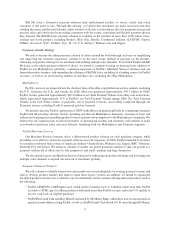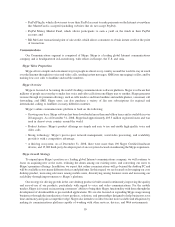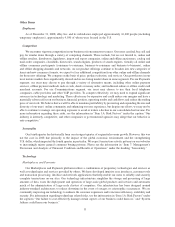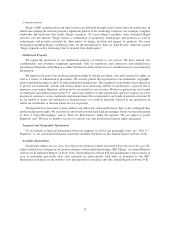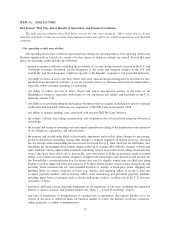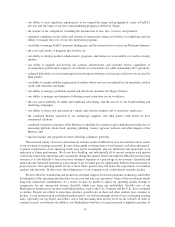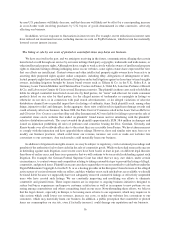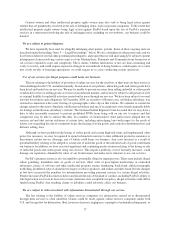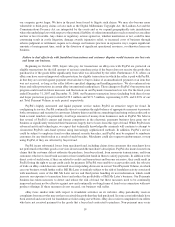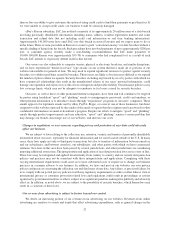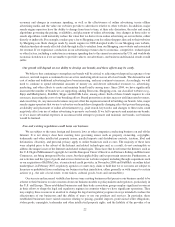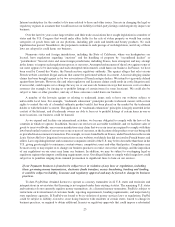eBay 2008 Annual Report Download - page 23
Download and view the complete annual report
Please find page 23 of the 2008 eBay annual report below. You can navigate through the pages in the report by either clicking on the pages listed below, or by using the keyword search tool below to find specific information within the annual report.we are unable to change our services in ways that reflect the changing demands of the ecommerce marketplace,
particularly the higher growth of sales of fixed-price items and higher service levels, our business will suffer.
In January and June 2008, we announced significant changes to our Marketplaces business in four major areas:
fee structure, seller incentives, standards and buyer and seller feedback and increased buyer and seller protections in
the U.S. In August 2008, we announced a series of pricing, shipping and other changes for our Marketplaces
business in our three largest markets: the U.S., Germany and the U.K. We may make further changes in these or
other areas in the future. Some of the changes that we have announced to date have been controversial with, and led
to dissatisfaction among, our sellers, and additional changes that we announce in the future may also be negatively
received by a number of our sellers. Given the number of recent changes that we have made to our policies and
pricing, it may take a number of our sellers some time to fully assess and adjust to these changes, and sellers may
elect to reduce volume while making such assessments and adjustments. If any of these changes cause sellers to
move their business (in whole or in part) away from our websites or otherwise fail to improve gross merchandise
volume or the number of successful listings, our operating results and profitability will be harmed.
In addition, because a large percentage of PayPal transactions originate on the eBay platform, declines in
growth rates in major Marketplaces markets also adversely affect PayPal’s growth rate. The expected future growth
of our PayPal, Skype, StubHub, and other lower margin businesses may also cause downward pressure on our profit
margins because those businesses have lower gross margins than our Marketplaces platforms.
An economic recession could harm our business.
Our Marketplaces and Payments businesses are dependent on consumer purchases. The current economic
downturn has resulted in reduced selling prices and may reduce the volume of purchases on our Marketplaces
platforms and the volume of transactions paid for using our PayPal payment service, and adversely affect our
business. In addition, an economic downturn will likely continue to require us to increase our reserves for bad debt
and transaction losses. Continuing poor economic conditions will likely continue these trends.
We are exposed to fluctuations in currency exchange rates and interest rates.
Because we conduct a significant and growing portion of our business outside the United States but report our
results in U.S. dollars, we face exposure to adverse movements in currency exchange rates. In connection with its
multi-currency service, PayPal fixes exchange rates twice per day, and may face financial exposure if it incorrectly
fixes the exchange rate or if exposure reports are delayed. PayPal also holds some corporate and customer funds in
non-U.S. currencies, and thus its financial results are affected by the translation of these non-U.S. currencies into
U.S. dollars. In addition, the results of operations of many of our internationally focused websites are exposed to
foreign exchange rate fluctuations as the financial results of the applicable subsidiaries are translated from the local
currency into U.S. dollars upon consolidation. If the U.S. dollar weakens against foreign currencies, the translation
of these foreign currency denominated transactions will result in increased net revenues, operating expenses, and
net income. Similarly, our net revenues, operating expenses, and net income will be negatively impacted if the
U.S. dollar strengthens against foreign currencies, as happened in the second half of 2008. Based on changes in
foreign currency rates year over year, net revenues in the fiscal year ended December 31, 2008 were positively
impacted by foreign currency translation of $190.9 million, compared to the prior fiscal year. However, net revenues
in the three months ended December 31, 2008 were negatively impacted by foreign currency translation of
$104.9 million, compared to the same period of the prior fiscal year. Similarly, based on changes in foreign currency
rates year over year, operating income for the fiscal year ended December 31, 2008 was positively impacted by
foreign currency translation of $130.6 million, compared to the prior fiscal year, but operating income for the three
months ended December 31, 2008 was negatively impacted by foreign currency translation of $39.0 million,
compared to the same period of the prior fiscal year. As exchange rates vary, net sales and other operating results,
when translated, may differ materially from expectations. In particular, to the extent the U.S. dollar strengthens
against the Euro, British pound, Australian dollar, or Canadian dollar, our foreign revenues and profits will be
reduced as a result of these translation adjustments. While from time to time we enter into transactions to hedge
portions of our foreign currency translation exposure, it is impossible to perfectly predict or completely eliminate
the effects of this exposure. In addition, to the extent the U.S. dollar strengthens against the Euro, the British pound,
the Australian dollar, and the Canadian dollar, cross-border trade related to purchases of dollar-denominated goods
15


